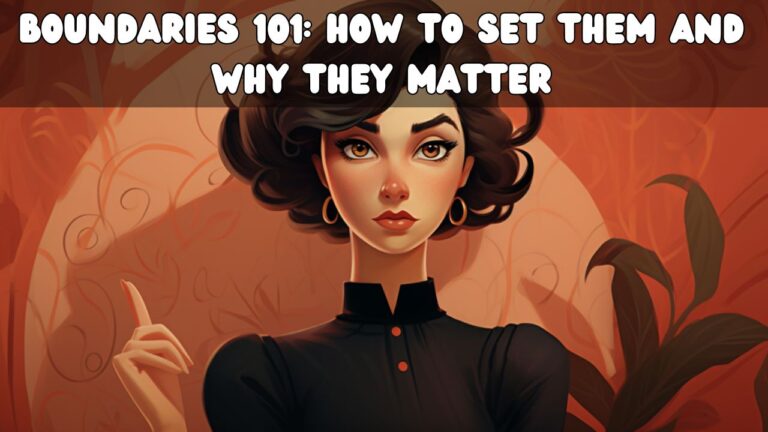
Boundaries 101: How to Set Them and Why They Matter
In today’s interconnected world, the boundaries that define us—whether they be emotional, physical, or digital—are more essential than ever. These unseen walls serve as guidelines, marking the balance between self and others, autonomy and connection. Yet, they are frequently misunderstood, often leading to unnecessary conflicts and misunderstandings in our personal and professional lives.
The Importance of Boundaries in Maintaining Harmony
Boundaries, at their core, are a reflection of our values, needs, and self-worth. They communicate to others how we expect to be treated, what we’re comfortable with, and what’s non-negotiable. Just as fences and walls protect a home, personal boundaries safeguard our mental and emotional well-being. They prevent unnecessary intrusions and ensure that respect and understanding remain at the forefront of any relationship. When boundaries are clear and respected, they foster a sense of trust, allowing relationships to flourish in a space of mutual respect. It’s when these boundaries are either unclear or repeatedly crossed that discord arises.
Brief Overview of Topics to be Covered
This article seeks to demystify the concept of boundaries, explaining their importance in various relationships and contexts. We’ll delve into understanding what boundaries truly are and why they matter so profoundly. The consequences of blurred or non-existent boundaries will be highlighted, emphasizing the significance of recognizing and upholding them. Furthermore, practical advice will be shared on how to set clear boundaries and ensure they are respected by others. Similarly, we’ll touch upon the crucial aspect of respecting the boundaries set by others, ensuring mutual respect in any relationship. By the end, the hope is that readers will not only grasp the necessity of boundaries but also feel empowered to establish and honor them in their daily lives.
Understanding Boundaries

In the vast realm of human interactions, boundaries play a pivotal role. They dictate the rules of engagement, serving as markers that define how we relate to the world and the people around us. However, despite their importance, they often remain intangible and misunderstood. By gaining a clearer understanding of what boundaries are and the various forms they take, we can navigate our relationships with greater confidence and clarity.
What are Boundaries?
Definition and Importance
Boundaries can be best described as the invisible lines or limits that we set to protect our emotional, mental, and physical well-being. They delineate what we consider acceptable behavior towards us and what we deem overstepping or intrusive. Boundaries are the personal rules or guidelines we establish for ourselves based on our values, experiences, and needs.
Their importance cannot be overstated. Boundaries empower us to maintain our autonomy in relationships, ensuring that our needs and feelings are acknowledged and respected. They allow us to differentiate ourselves from others, reinforcing our identity and self-worth. When effectively communicated and upheld, boundaries lead to healthier, more respectful, and fulfilling relationships. Conversely, the lack or violation of boundaries can result in feelings of resentment, discomfort, or violation.
Different Types of Boundaries (Emotional, Physical, Digital, etc.)
- Emotional Boundaries: These relate to a person’s feelings and emotions. Establishing emotional boundaries means recognizing and communicating one’s emotional needs and limits. For instance, deciding not to discuss certain traumatic events or personal topics unless with trusted individuals is setting an emotional boundary.
- Physical Boundaries: Pertaining to personal space and physical touch, these boundaries define what kind of physical contact is acceptable and with whom. This could range from preferences in hugging and hand-holding to more intimate interactions. Respecting someone’s physical boundaries might mean understanding when they don’t want to be touched or need personal space.
- Digital Boundaries: With the rise of technology and social media, digital boundaries have become increasingly relevant. These boundaries relate to online privacy, the sharing of personal information, and the nature of digital interactions. Setting a digital boundary could include not accepting friend requests from coworkers or deciding not to share personal life details on public platforms.
- Mental Boundaries: These boundaries relate to thoughts, values, and opinions. Respecting mental boundaries involves recognizing and not violating another person’s thoughts or belittling their opinions. This can also involve protecting one’s own mental space from unsolicited advice or negativity.
- Time Boundaries: This involves allocating specific times for work, leisure, relationships, and self. It’s about respecting one’s own time and the time of others. An example would be setting specific hours where one is unavailable for work-related matters to prioritize family or self-care.
As we delve deeper into the topic, it’s essential to remember that boundaries are deeply personal. What might seem acceptable to one person could be a boundary violation for another. Recognizing and respecting these variations is the cornerstone of healthy interpersonal relationships.
Why Do Boundaries Matter?

Boundaries are not just about delineating personal space or setting limits; they are crucial foundations upon which mutual respect, trust, and healthy relationships are built. Often, in our eagerness to forge connections or to avoid conflict, boundaries might get overlooked. Yet, their presence or absence can profoundly influence the course of our relationships and our self-worth. Here’s a closer look at why boundaries are indispensable:
Ensuring Respect in Relationships
The Role of Boundaries in Mutual Respect
Boundaries articulate our expectations, needs, and comfort zones to others. When someone respects our boundaries, they’re acknowledging our individuality and inherent worth. Similarly, when we respect someone else’s boundaries, we affirm their autonomy and right to personal agency. This mutual recognition and validation form the bedrock of healthy, respectful relationships.
In relationships without clear boundaries, misunderstandings are rife. Over time, repeated boundary violations can breed resentment and mistrust, eroding the bond between individuals. On the other hand, well-communicated and respected boundaries create a sense of safety and understanding, allowing relationships to flourish.
Protecting Emotional Well-being
Boundaries serve as shields, safeguarding our emotional and psychological well-being from potential harm. By setting limits on what we find acceptable, we protect ourselves from undue stress, emotional manipulation, or potential abuse. Relationships that honor these protective boundaries tend to be more nurturing and less volatile.
Maintaining Personal Integrity and Self-Respect
Boundaries as Reflections of Our Values
Our boundaries often mirror our core values and beliefs. When we establish and uphold our boundaries, we are effectively standing up for what we believe in. This act of self-affirmation reinforces our personal integrity and asserts our identity. For instance, if honesty is a value we deeply cherish, setting a boundary against deception or dishonesty in our interactions underlines our commitment to that principle.
The Link Between Boundaries and Self-Esteem
Boundaries are intrinsically tied to our self-esteem and self-worth. Every time we set a boundary, we send a message to ourselves and the world that we value our well-being and deserve respect. Conversely, allowing our boundaries to be consistently violated can erode our self-respect, leading to feelings of powerlessness or diminished worth.
In conclusion, boundaries are not mere barriers or walls; they are essential tools that enable us to navigate the complex world of interpersonal relationships with confidence and dignity. By recognizing their importance, we pave the way for more enriching, respectful, and fulfilling connections with others and a deeper understanding and appreciation of ourselves.
The Consequences of Blurred Boundaries

The boundaries we establish in our relationships, whether consciously or subconsciously, play a pivotal role in determining the quality and health of our interactions. While setting clear boundaries promotes understanding and mutual respect, blurred or weak boundaries can lead to a plethora of complications. Let’s delve into the consequences that arise from undefined or frequently violated boundaries:
Loss of Personal Identity
Dilution of Self in the Quest to Please
When boundaries aren’t firm, there’s a tendency to mold ourselves to fit the expectations or desires of others. Over time, this can lead to the suppression of our own needs, desires, and values. We may begin to prioritize others’ happiness over our own to the point where we lose touch with what truly matters to us. The constant effort to blend in or please can cause us to lose our authentic selves, leading to questions like, “Who am I really?” or “What do I genuinely want?”
Overstepping and Being Overstepped
In relationships with blurred boundaries, there’s often an imbalance of power. One might constantly overstep while the other keeps receding, leading to a dynamic where one person’s identity overshadows the other’s. This imbalance can cause the subdued individual to feel invisible, unimportant, or lost.
Increased Risk of Conflict and Resentment
Misunderstandings and Misperceptions
Without clear boundaries, actions and intentions can easily be misinterpreted. What one person views as a harmless comment or gesture might deeply upset another. These misunderstandings can sow seeds of discord, leading to arguments, hurt feelings, and lasting resentment.
The Build-up of Silent Grudges
In the absence of clear boundaries, individuals might suppress their discomfort or grievances, believing it’s better to avoid conflict. However, these unexpressed feelings don’t vanish; they accumulate. Over time, this build-up can explode in unexpected ways, damaging the relationship irreparably.
Emotional Exhaustion and Burnout
The Toll of Constant Vigilance
When boundaries are blurred, there’s often a sense of being on guard. The uncertainty of how others might behave or what they might expect can be mentally taxing. Over time, the stress of constantly navigating these unpredictable waters can lead to emotional fatigue.
The Weight of Over-Extending
Without clear boundaries, there’s a risk of taking on more than one can handle, be it emotionally, mentally, or physically. Continuously prioritizing others, neglecting personal needs, or absorbing others’ emotional baggage can lead to burnout. This exhaustion not only affects one’s mental well-being but can also manifest in physical ailments, reduced productivity, and diminished enthusiasm for life.
In summary, while the idea of setting strict boundaries might seem limiting or rigid, the consequences of blurred boundaries underscore their necessity. Clear boundaries don’t constrict but liberate, allowing individuals to engage in relationships with clarity, respect, and genuine mutual appreciation.
Setting Clear Boundaries

In the tapestry of relationships, boundaries act as the threads that keep each individual distinct yet interwoven, ensuring that the entire fabric remains strong and cohesive. Establishing boundaries isn’t about building walls or shutting others out; it’s about recognizing and honoring one’s own needs, values, and limits. Setting clear boundaries starts with understanding oneself. Let’s delve into the process of recognizing our own needs and why it’s crucial for boundary-setting:
Recognizing Your Own Needs
Self-awareness and Reflection
Self-awareness is the foundation upon which clear boundaries are built. By deeply introspecting and understanding our own emotions, triggers, and limits, we can better define what we’re comfortable with and what we’re not. Regular self-reflection, whether through journaling, meditation, or simply quiet contemplation, allows us to unearth and recognize our genuine needs. It helps in distinguishing between what is truly essential for our well-being and what is merely a fleeting desire.
Understanding oneself also involves being aware of past experiences, traumas, and patterns that might influence our boundaries. Some boundaries might be set based on past hurts, while others stem from our core values and beliefs. Recognizing the roots of our boundaries aids in setting ones that are both protective and conducive to healthy relationships.
Importance of Self-care
The term ‘self-care’ has gained immense popularity in recent years, and rightly so. It’s not just about spa days or indulgent treats, but about genuinely taking the time to cater to our emotional, physical, and mental well-being. Recognizing the importance of self-care ties closely with understanding our needs.
When we prioritize self-care, we inherently acknowledge our own worth and the necessity of catering to our needs. It sends a strong message, both to ourselves and to others, about our boundaries concerning our time, energy, and mental space. Whether it’s setting aside time for a hobby, seeking therapy, or simply ensuring we get adequate rest, prioritizing self-care underscores the importance of our boundaries.
To conclude this section, setting clear boundaries is intrinsically linked to understanding and respecting oneself. It’s a journey of deep self-discovery, where we learn to honor our feelings, needs, and desires, ensuring that our interactions with others remain respectful, healthy, and fulfilling.
Communicating Your Boundaries

In the realm of relationships, understanding our own boundaries is only half the battle. The next pivotal step is effectively conveying these boundaries to others. Communication, in this context, becomes an art—where clarity meets empathy, and assertion coexists with understanding. It’s not just about stating our boundaries, but ensuring that they are understood, respected, and reciprocated. Let’s explore the nuances of effectively communicating our boundaries:
Effective and Clear Communication
Choosing the Right Words and Tone
The way we present our boundaries can greatly influence how they are received. It’s essential to use language that is clear, concise, and devoid of ambiguity. For instance, instead of saying, “I might need some time alone after work,” one could assert, “I need an hour to myself after I come back from work to unwind.” This not only specifies the need but also clarifies the duration.
Moreover, the tone plays a significant role. Maintaining a calm and composed demeanor ensures that the message isn’t lost in heightened emotions. It’s always beneficial to approach such conversations when one is in a relaxed state, reducing the chances of misinterpretation or defensiveness.
Being Transparent About Reasons (When Appropriate)
While one doesn’t always owe an explanation for their boundaries, sometimes providing a reason can help the other person understand better. Being transparent, especially with close friends and family, can bridge the gap of misunderstanding. For instance, “I avoid checking emails after 8 PM because it disrupts my sleep” can provide clarity and make it easier for the recipient to respect the boundary.
Standing Firm without Being Aggressive
Reiteration, Not Confrontation
It’s natural to encounter situations where one might have to restate their boundaries. In such cases, it’s crucial to remember that reiteration doesn’t mean confrontation. Politely yet firmly restating one’s boundaries can be more effective than resorting to aggressive or confrontational methods.
Assertiveness Over Aggression
Assertiveness is about expressing oneself confidently without violating the rights of others. It’s a middle ground between passive and aggressive behavior. While aggression might lead to resistance or conflict, being assertive ensures that one’s boundaries are communicated with respect and dignity. Practicing phrases like “I understand where you’re coming from, but I need…” or “It’s important for me that…” can be instrumental in standing firm without coming off as aggressive.
To encapsulate, while our boundaries stem from our personal needs and values, their effectiveness in relationships hinges on how well they are communicated. By ensuring clarity, empathy, and firmness in our approach, we can pave the way for mutual respect and understanding in all our interactions.
Dealing with Boundary Crossers

Navigating through relationships, both personal and professional, requires an intricate balance. While we may make a concerted effort to clearly define and communicate our boundaries, it’s inevitable that we encounter individuals who, intentionally or inadvertently, cross them. These boundary violations can range from subtle infringements to blatant disrespect. Handling such situations requires a combination of assertiveness, empathy, and strategy. Let’s delve into how to manage boundary crossers effectively:
Recognizing and Addressing Disrespect
Identifying the Signs
Before addressing boundary violations, it’s crucial to recognize them. Sometimes, these crossings can be subtle—like a friend consistently calling during your designated ‘me time,’ or a colleague continually making requests outside of work hours. Other times, they’re more obvious, like someone making unwarranted physical contact or openly belittling your personal choices.
It’s essential to trust your feelings. If an interaction leaves you feeling uneasy, violated, or disrespected, it’s a clear sign that a boundary has been crossed.
Immediate Versus Delayed Response
Depending on the situation and the level of discomfort, it might be beneficial to address the violation immediately. A simple, “I’m not comfortable with that,” can be a clear and effective way to communicate a boundary.
However, there are times when it’s more appropriate to take a step back, process the situation, and address it later. This can be especially true in emotionally charged situations or when a more thoughtful response is required.
Handling Difficult Conversations with Grace
Choosing the Right Environment
Addressing boundary violations often requires difficult conversations. It’s beneficial to choose an environment where both parties can feel at ease and are free from distractions. This can be a quiet room, a neutral location, or even a space where positive memories have been shared.
Using “I” Statements
When discussing boundary issues, using “I” statements can be an effective way to express feelings without placing blame. Instead of saying, “You always interrupt me,” try, “I feel unheard when I’m interrupted during conversations.” This approach is less confrontational and opens the door for understanding and resolution.
Seeking Understanding
It’s important to remember that not all boundary crossings are malicious. Sometimes, they stem from ignorance, cultural differences, or miscommunication. By asking open-ended questions like, “Can you help me understand why you did that?” or “Were you aware that this makes me uncomfortable?”, you can provide the other person an opportunity to share their perspective.
Reestablishing Boundaries
After addressing the violation, it’s crucial to restate and, if necessary, redefine your boundaries. This ensures clarity moving forward and minimizes potential recurrences.
In conclusion, dealing with boundary crossers is an inevitable part of our interpersonal journeys. However, with self-awareness, assertiveness, and empathy, these challenges can be navigated, leading to stronger, more respectful relationships.
The Mutual Respect of Boundaries

While much emphasis is placed on understanding and setting our boundaries, it is equally essential to recognize and respect the boundaries set by others. This mutual respect serves as the bedrock for any healthy relationship, whether it’s with friends, family members, or partners. By honoring the boundaries of others, we foster a relationship environment where trust and understanding can flourish. Let’s delve deeper into why respecting the boundaries set by others is so pivotal.
Why Respecting Others’ Boundaries is Crucial
Fostering Trust in Relationships
When individuals know that their boundaries are understood and respected, it lays the foundation for trust. Trust is not merely about reliability or predictability; it’s about feeling safe and protected in another’s presence. It’s about knowing that the other person values and honors your emotional, physical, and psychological space.
By consistently respecting boundaries, you signal to the other person that their feelings, needs, and comfort are paramount to you. Over time, this consistency fosters a deep-rooted trust, making the relationship resilient and robust.
Consider trust as the glue that holds relationships together. When boundaries are repeatedly violated, that glue weakens, making the relationship susceptible to further issues and conflicts. On the other hand, when boundaries are consistently respected, trust solidifies, acting as a protective barrier against potential relationship strains.
Building Stronger, Deeper Connections
Beyond trust, respecting boundaries contributes to the depth and strength of the connection shared between individuals. When people feel seen, heard, and valued in a relationship, they’re more likely to open up, share their vulnerabilities, and forge a deeper bond.
Respecting boundaries isn’t just about avoiding certain topics or refraining from specific actions. It’s about being attuned to the other person’s needs and emotions. It’s about actively listening, showing empathy, and creating an environment where both parties feel validated.
Such an environment allows for genuine conversations, shared experiences, and mutual growth. It paves the way for a bond that isn’t just superficial but deeply rooted in mutual respect and understanding.
In essence, the mutual respect of boundaries isn’t just a concept to be understood; it’s a practice to be embodied. It’s a continuous journey of tuning in, adjusting, and fostering an environment where both individuals feel valued and protected. In doing so, we not only enrich our relationships but also empower ourselves and others to navigate the intricate dance of human connection with grace and dignity.
Signs You May Be Overstepping

Human relationships are intricate and, at times, fraught with misunderstandings. As we navigate these relationships, it’s possible to unintentionally overstep someone’s boundaries. Recognizing when we’ve done so is crucial for maintaining trust and mutual respect. More often than not, the signs are subtle, but with keen observation and self-awareness, they can be discerned. Let’s delve into how to recognize the patterns of overstepping and the necessary steps to make amends.
Recognizing the Patterns
Shifts in Communication
One of the most prominent signs that you might be overstepping someone’s boundaries is a noticeable change in how they communicate with you. This could manifest as shorter responses, longer periods between replies, or a general sense of guardedness in their interactions.
Body Language Cues
Non-verbal cues can be incredibly telling. If someone starts to physically distance themselves, avoids eye contact, or their body language appears closed off (like crossed arms or turned away posture), it might indicate discomfort stemming from a boundary violation.
Vocal Changes
A change in tone, pitch, or the speed of speech can be an unconscious reaction to discomfort. If someone suddenly starts speaking more quickly, becomes notably quieter, or their voice holds a tense edge when communicating with you, it’s essential to take notice.
Avoidance or Withdrawal
If someone you usually share a close bond with begins to avoid meetings or reduces the frequency of your interactions, it could be a sign that they feel their boundaries have been infringed upon.
Apologizing and Making Amends
Once you recognize that you might have overstepped, the next steps are critical in repairing and maintaining the relationship.
Acknowledge and Apologize
Start by acknowledging your actions without offering justifications. A simple, “I realize I might have crossed a line with [specific action]. I’m genuinely sorry for that,” can go a long way. Authenticity is key here; avoid non-apologies like “I’m sorry you feel that way.”
Ask for Feedback
Understanding where you went wrong can help prevent future mishaps. Respectfully ask the other person if they’re comfortable sharing how you overstepped. This shows that you value their feelings and want to understand their boundaries better.
Commit to Change
Assure the individual that you’ll be more mindful in the future. This might mean educating yourself further about boundaries or seeking feedback regularly to ensure you’re on track.
Respect Their Need for Space
If someone needs time or space after a boundary has been crossed, it’s vital to respect their wishes. This allows them the time they need to process the situation and decide how they want to proceed.
In conclusion, recognizing when we overstep and making genuine efforts to make amends is a testament to our commitment to healthy and respectful relationships. It’s not about being perfect but about being accountable, compassionate, and willing to learn and grow.
Final Thoughts

Navigating the intricate tapestry of human relationships requires skill, patience, and a keen understanding of oneself and others. At the heart of these connections lies the delicate balance of setting and respecting boundaries. By establishing clear boundaries, we affirm our self-worth, preserve our emotional well-being, and communicate our needs and desires effectively. But it doesn’t stop there; respecting the boundaries set by others is just as crucial, serving as a testament to the value we place on the relationship.
The Balance of Setting and Respecting Boundaries
Every individual has a unique set of needs, desires, and thresholds of comfort. Establishing boundaries is not about erecting impenetrable walls but rather delineating personal space where one can thrive and grow. It’s an act of self-love and self-preservation. However, the true beauty of boundaries emerges when they are met with understanding and respect. When both parties in a relationship recognize and honor each other’s boundaries, it creates an environment of mutual respect, understanding, and trust.
The Journey to Healthier, More Respectful Relationships
The path to cultivating healthier, more respectful relationships is ongoing. It requires continuous self-awareness, open communication, and a willingness to adapt and grow. Every relationship will have its challenges, but by setting and respecting boundaries, we lay the foundation for connections rooted in genuine understanding and mutual respect. It’s a journey worth embarking on, for it leads to relationships that enrich our lives and elevate our understanding of love, trust, and true partnership.
In the grand tapestry of our relationships, boundaries are the threads that hold everything together, ensuring each connection remains strong, vibrant, and filled with mutual respect.
You may like
Belinda Balance is a dedicated yoga enthusiast who has integrated the wisdom of ancient practices into modern relationships. Her life revolves around maintaining harmony in all aspects, especially in love and companionship. She believes that just like our bodies, relationships require balance, flexibility, and a lot of practice to stay healthy.
Belinda has dedicated her life to teaching others about the importance of mindfulness in relationships, often drawing parallels between the discipline required in yoga and the commitment necessary in relationships.
-
Belinda Balancehttps://loveinteract.com/author/belinda-balance/
-
Belinda Balancehttps://loveinteract.com/author/belinda-balance/
-
Belinda Balancehttps://loveinteract.com/author/belinda-balance/
-
Belinda Balancehttps://loveinteract.com/author/belinda-balance/






